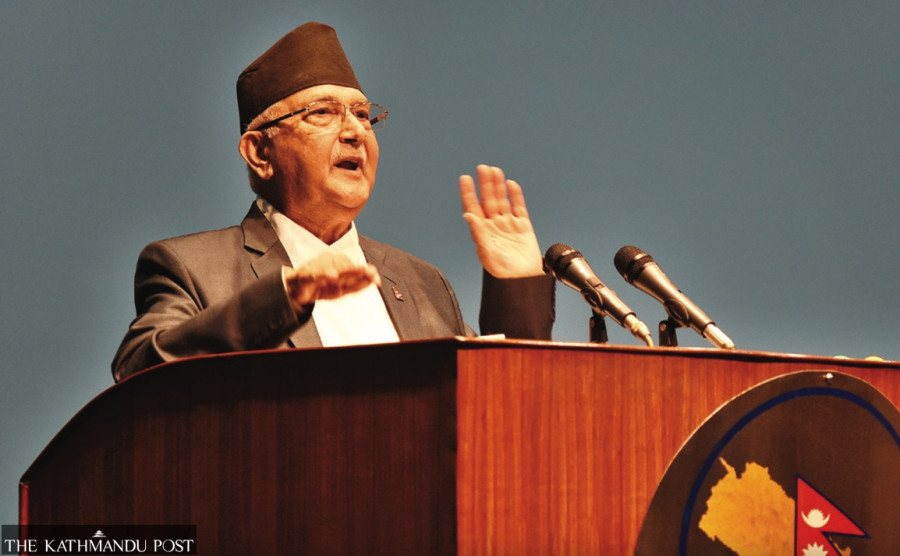National
Opposition lashes out at the government for proroguing Parliament
After failing to give business to the House, the Deuba administration, which is unsure of its strength to pass bills, has ended the session that started a month ago.
Tika R Pradhan
After the Supreme Court reinstated the House of Representatives on February 23, terming its dissolution on December 20, 2020, unconstitutional, its sessions were limited to endorsing condolence motions on the demise of incumbent and former lawmakers.
The then KP Sharma Oli government did not give it any business to discuss bills and make laws and for this the prime minister faced much criticism. The House was then prorogued after 44 days, a week before the budget for the fiscal year 2021-22 was due to be presented.
Now, Prime Minister Sher Bahadur Deuba has followed suit.
On the recommendation of his Cabinet, President Bidya Devi Bhandari on Monday prorogued Parliament. The House of Representatives did not discuss any bills, let alone pass one.
Like his predecessor Oli, Deuba seems bent on ruling through ordinances.
“Ruling the country through ordinances can never be good and acceptable,” said Jhalak Subedi, a political analyst.
Oli had issued 15 ordinances and all but one of them were presented in the lower house when it was convened on July 18 as per the Supreme Court order.
Among these ordinances that are yet to become law are one related to deterrence for acid attacks and punishment and another on violence against women.
Deuba was reluctant to present any bills in the House because the coalition government–of Nepali Congress, Communist Party of Nepal (Maoist Centre) and Janata Samajbadi Party–was unsure of its strength in the House, according to analysts.
“If the rulers think they have no majority, they better go for elections,” Subedi told the Post.
With only the support of the 61 lawmakers from the Nepali Congress, 49 from the Maoist Centre and some 20 from the Janata Samajbadi Party to count on, the government would have fallen short of reaching 136 lawmakers required for a majority.
During the 29 days of the House session, the only business of note it performed was to give Deuba a confidence vote on July 18, just like Oli seeking a confidence vote on May 10 which he lost.
The CPN-UML, the main opposition, was quick to pounce upon the government’s failure to pass any bills.
“The government failed to give business to the House for one month. Now the House has been prorogued suddenly without consulting the opposition,” said Subas Nembang, deputy parliamentary party leader of the CPN-UML. “Whatever has happened is unfortunate.”
But Nepali Congress leaders defended the House prorogation.
“Actually, we needed more time to forge consensus on pending bills among parties and that is the reason we decided to prorogue this session,” said Bal Krishna Khand, the home minister.
But other leaders did not rule out the possibility of ordinances.
“The House was prorogued because the government could not give business, but ordinances could be introduced when necessary,” a Nepali Congress leader told the Post.
One ordinance that is likely, according to opposition leaders, is amending the Political Parties Act-2017, making party split easier, UML leaders say.
“The main intention of the Deuba government to prorogue the House is to bring an ordinance to split our party,” Mahesh Basnet, a UML lawmaker, told the Post.
The Madhav Kumar Nepal faction of the UML which voted for Deuba on July 18 has for long been at loggerheads with the party chair Oli. But it has not been able to make a decision–whether to remain within the UML or form a new party. The faction lacks the numbers in the Central Committee and Parliamentary Party to form a new party.
The Deuba government could issue an ordinance to amend the Political Parties Act-2017 to ease the party split. As per existing provisions, for any group to register a new party, it must have 40 percent of members in the Central Committee and the Parliamentary Party.
“It seems that they are focused on bringing an ordinance to make party split easier so as to break our party,” says Khimlal Bhattarai, chief whip of the UML at the National Assembly.
An ordinance to amend the Act could, however, not be favourable to Deuba as it would make it easier for the Mahantha Thakur faction of the Janata Samajbadi Party, which is not firmly behind the prime minister, to split the party.
The Thakur group has been relegated to the minority in the party after the Election Commission handed over the party to Upendra Yadav and Baburam Bhattarai.
The Thakur faction has challenged the Election Commission decision in the Supreme Court. The court was expected to give a decision on Monday but it did not issue any order.
“Today, the Supreme Court refused to give an interim order, but the hearing will continue to decide whether the Election Commission’s decision was legal or not,” said Surendra Jha, a leader of Janata Samajbadi Party close to Thakur.
If the Supreme Court does not annul the Election Commission's decision, the Thakur faction will be left with little options. It either has to remain under Yadav’s leadership or form a new party.
The Nepal faction too faces a dilemma, and according to Nepali Congress leaders, it is unsure whether it wants to split from the UML.
“I don’t think the Nepal faction is ready for a split,” said the Nepali Congress leader.
Oli, meanwhile, has called an informal meeting of major leaders of the party to chart out its strategy.
According to UML’s Basnet, the coalition partners that used to accuse the Oli government of attacking democratic practices and the parliamentary system are now following Oli’s path.
“Let’s see how pro-democracy forces and experts come up with their assessment of this development,” said Basnet. “Today’s prorogation has proved that our conclusion that this House cannot run is right.”




 13.12°C Kathmandu
13.12°C Kathmandu














